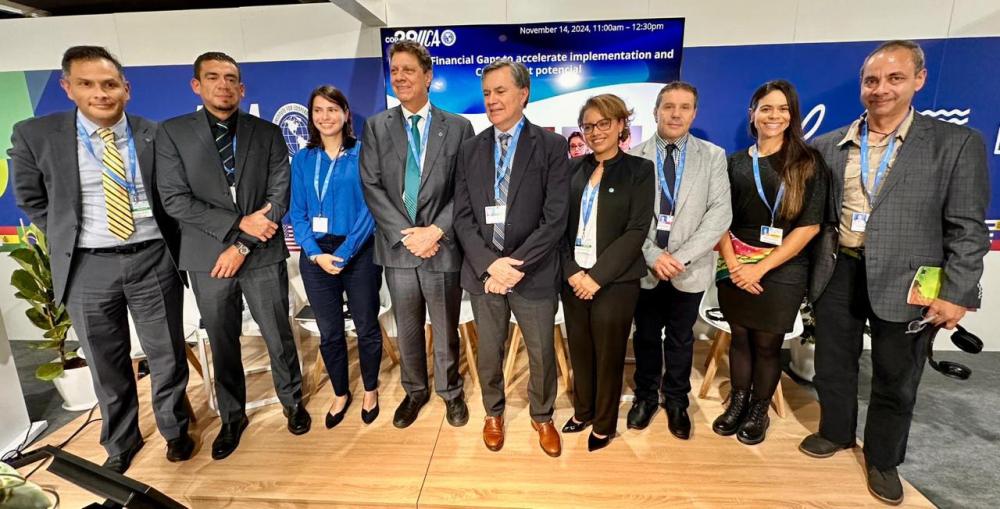“Bridging Financial Gaps to Accelerate the Implementation of Climate Smart Agrifood Systems” was the title of a panel discussion exploring strategies to redirect and scale up financial flows.

Baku, Azerbaijan, 15 November 2024 (IICA) – Farmers need financing and greater economic incentives that will motivate them to increase their adoption of best practices and to be more resilient. This was the warning sounded in an event at the Home of Sustainable Agriculture of the Americas, the pavilion representing the voice of the sector at COP29.
For the third consecutive year, in the wake of its experiences at COP27 in Egypt and COP28 in the United Arab Emirates, the Inter-American Institute for Cooperation on Agriculture (IICA), along with its private and public sector partners, is in attendance at the most important global discussion forum on tackling the climate crisis.
The pavilion is representing the most important players in agrifood production from the region.
“Bridging Financial Gaps to Accelerate the Implementation of Climate Smart Agrifood Systems” was the title of a panel discussion exploring strategies to redirect and scale up financial flows.
The debate touched on issues such as mechanisms to expand the capacities of multilateral development banks, to optimize public budgets and to increase the private capital available to small farmers and vulnerable communities.
It also focused on the need to align the transformation of national agrifood systems with climate commitments to foster sustainable financing of the Paris Agreement objectives. Among the participants were leaders of financial institutions and ministers of Agriculture.
IICA Director General, Manuel Otero, in opening the conversation, revealed that, “The aim is to advance climate ambition and strengthen action. We are promoting discussion on how to overcome barriers and to strengthen the role of multilateral funding agencies and governments, so that public budgets will be conducive to the transformation of agrifood systems”.
He noted that, “Farmers are ready and willing to be the protagonists of a new era, but it will be costly. We will need money in order to adapt to the reality imposed by climate change. Farmers need new income streams, for example, from carbon markets.
Farmers and the Paris Agreement
Franz Tattenbach, Minister of Environment and Energy of Costa Rica, also stressed that the true challenge was to create incentives to motivate farmers to increase their commitment to the objectives outlined by governments of the world under the Paris Agreement.
“We need to focus on climate change adaptation”, he insisted. “Our farmers in Costa Rica have behaved admirably, because they have avoided deforestation in our country. We could never accuse them of doing the wrong thing. In Costa Rica today, there is a keen interest in reducing greenhouse gas emissions. Yet, the challenge is incentives. I don’t believe that the current prices offered by voluntary carbon markets are enough to move the needle as far as the means of production are concerned”.
Gonzalo Becoña, environmental expert from Uruguay’s National Agricultural Research Institute (INIA, for its acronym in Spanish), noted that one problem is that most climate funding available in the world is for mitigation rather than for adaptation.
He pointed out that, “In our countries, the major problem is adaptation. We need to be resilient in order to continue producing and today it is extremely difficult to access funding. That is why, in recent years, Uruguay has started to develop new instruments to mobilize resources”.
Becoña underscored the critical need for the countries of the global South to develop information systems to document the results of internationally funded climate projects. “If we want funding, we need to be prepared institutionally and to have agreements within the country”.
Verónica Ruiz, head of the Project Development Department of the Central American Bank for Economic Integration (CABEI) expressed the commitment of that financial institution to climate action.
She remarked that, “We are promoting sustainable projects that build resilience and reduce emissions. Many countries still lack systems capable of measuring the true impact of forest conservation or waste management programs. So, we have been developing special grants to build capacities in the agriculture sector, as we are committed to agricultural productivity and climate resilience”.
More information:
Institutional Communication Division.
comunicacion.institucional@iica.int











